Your car is not starting. Plus, you can’t hear any engine noises or clicking sounds. This can be quite frustrating. We get it, but what’s causing this?
When your car won’t start and you don’t hear any clicking or noise, the main cause is a dead battery. The starter may not be receiving enough power. You should be able to test functionality using your owner’s manual and a voltmeter. If there is no sound, but there’s light, the starter solenoid or relay may be faulty. However, your battery is undoubtedly to blame if there is no sound, not even a click.
Read on to learn more about the root cause of why your car won’t start and how to fix it.
Why My Car Won’t Start (No Clicking)
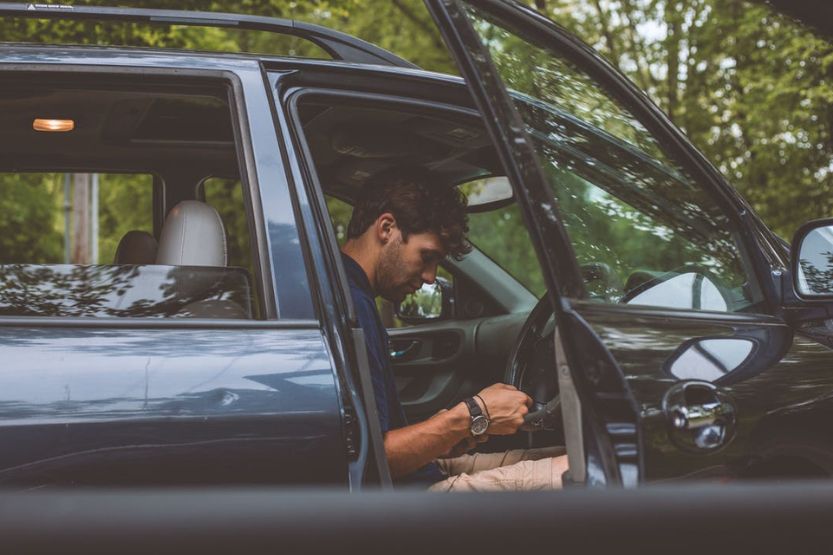
We all rely on our cars so much these days that it may ruin your day when you get in, turn the key, and nothing happens.
Might Be Due to a Dead Battery
The most common cause for why your engine won’t start when you turn the ignition key is usually a dead battery. Luckily, you should be able to troubleshoot the issue yourself and see how to proceed.
Blown Fuse
Apart from a dead battery, the main fuse may have blown too, which could disable the engine from running normally. Both symptoms are usually the same and simple to detect and fix.
Gasoline and Diesel Engines May Experience the Same Problems
Now, we should mention that every modern internal combustion engine, whether it runs on diesel or gasoline, may experience the same problem.
Electric Cars Produce No Sound When Starting
Note that all-electric cars and certain hybrid vehicles produce no noise at all when they first start. Is your car one of those?
Cars with Manual Transmissions Requires Clutch Compression Before Starting
Also, remember that some new cars with manual transmissions require you to compress the clutch before the engine starts. Similarly, many automatics will not start unless you are using the brake.
Absence of a Clicking Noise Is a Sign of a More Serious Problem
You know the starter motor’s pinion is inactive when you hear nothing, not even a clicking noise. This can be a sign of one or more severe problems.
As mentioned earlier, the pinion will stick out and spin if the starter solenoid operates and gets enough current. You might only hear a click if it’s not getting enough charge. This is the protruding pinion. However, you can’t spin the flywheel since there is insufficient electrical power.
How to Start a Diesel Engine
Diesel engines function a little bit differently than gasoline ones. It works similarly: fuel and air are mixed and ignited to push pistons down before this motion is transformed into a rotational force.
Diesel, however, doesn’t use a spark plug to ignite. Instead, it uses high compression. You will not find spark plugs anywhere in a diesel engine.
Glow plugs are a requirement that gasoline models do not have. To start the engine, glow plugs immediately heat the combustion chambers. Without these, it would be challenging to start a diesel engine, particularly on chilly mornings.
There is always a brief wait after turning the key in a diesel engine. The glow plugs are warming up during this period, enabling the engine to start.
Keep your diesel car in the start position for an additional few seconds if it doesn’t produce any noise when trying to start. You should not be causing any damage as long as the engine bay is quiet, but just in case, do not hold the key in the “start” position for longer than four or five seconds.
This could solve your issue. If your car starts, it’s worth checking and replacing the battery and glow plugs.
Top Reasons Why Cars Won’t Start
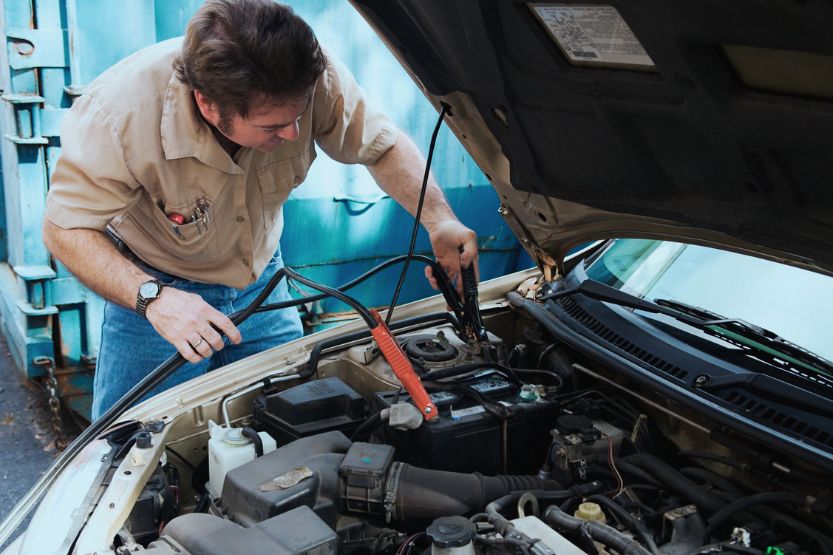
Getting a multimeter and a multifunctional car battery tester would be a good idea if you wanted to perform some diagnostic work independently. These are essential for identifying electrical problems if your car won’t start at all while making no noise.
Remember that electrical systems, particularly those found on hybrid and electric vehicles, can be harmful, so it is best to do this with caution. Otherwise, you can always take your car to a qualified and reliable mechanic if you have any doubts:
- Dead battery
- The main fuse (or wires) are not working
- Ignition switch
- Bad connections/ wiring
- Bad starter solenoid
- Bad fuse/relay: Ignition fuse /starter fuse blew
- Security system
- Wrong starting process: clutch pedal pressed
1. Dead Battery
A dead or failing battery is one of the main causes of the problem when your car won’t start without making noise.
Functional Electrical Components
Even though your battery is dead, some of your car’s electrical components may still function, occasionally running on a very low charge, enabling your lights to turn on but preventing your car from starting.
Your car’s headlights, radio, and other electronics may only need minimal power, allowing it to function with a very low or nearly dead battery. These components can operate on an almost dead battery because they typically only need 20 to 30 amps.
Engine Starters Need Around 300 Amps to Start the Engine
Engine starters, which can turn over your car, need roughly 300 amps all at once to start the engine. This is too much to handle for a battery with a low charge and is practically dead. So, you end up with a car not starting at all with not even a click.
Charge the Battery
If the battery fails a load test or tests low when checked using a hydrometer, you will need to charge it for the engine to function properly. If it can receive a charge from another battery and the car can start after receiving a jump, that should solve the problem.
Repair or Buy New Battery If the Battery Is Faulty
You may need to buy a new one or repair the battery if it is dead and not functioning properly. Sometimes you have to choose between replacing the battery and repairing it, depending on the worth of your car, how much you’re ready to pay, and the underlying cause of the issue.
2. Main Fuse (or Wires) Not Working
Your car’s electrical system has several fuses, but the battery is often connected to the electrical system by a huge primary fuse. Nothing will operate on your car if this fuse blows for some reason. In other words, it will be just as if the battery is dead.
If the primary fuse does not have a push-button reset, you can quickly check it with a multimeter to see if it’s blown, then replace it.
Hopefully, your car will start if you can reset the button. But, it’s important to remember that the fuse bursts for a reason. So, have an auto electrician inspect your electrical system if it happens again.
The cost of changing the primary fuse might only be a few dollars. However, several major fuses are integrated into the battery cable, significantly increasing costs.
3. Ignition Switch
The failure of ignition switches does happen quite often. Turn on your lights, then turn the ignition key to inspect quickly. If the car’s lights dim, your ignition switch is functioning properly.
If the lights do not dim, however, the starting circuit may be the source of the issue rather than the ignition switch. There will first need to be more checks.
If you can demonstrate the problem with the ignition switch, a replacement will cost at least $100 and much more in certain expensive cars.
4. Bad Battery Connections
Even though your lights are on, the battery connection may not be secure. While starting your engine requires a lot of amps and can be prevented by a poor connection, running your lights only uses little electricity compared to starting your engine.
The starter motor will likely make a clicking sound if this is the case.
The battery connectors may rust or become slack over time. Make sure the connections are secure, and the battery posts are clean. Also, check the damaged cable that connects the starter to the battery.
Using a multimeter to measure the cable resistance will allow you to verify this. There ought to be a short circuit.
Moreover, good connections to the ground are required for both the battery and starter motor. Make sure that these cables are connected securely and take a resistance reading.
This might be a very simple and inexpensive fix, costing only a few dollars or nothing unless you need to replace significant wires.
Again, what does it mean when your car won’t click? When you start the engine and there is no clicking noise, your car’s battery may be dead. But, if you hear a click, the problem lies with the starter. Use your manual and voltmeter to diagnose the problem.
5. Malfunctioning Starter Solenoid
A common issue with the engine starting system is a bad starter solenoid. The starter solenoid may be an independent component or a part of the starter motor.
While the engine is being started, a light tap on the starter solenoid can often liberate it. However, this is a warning sign that you must thoroughly check the system. In other words, the gentle tapping will stop working one day, and your car will not start, not even click.
6. Blown Fuse
Fuse testing is an easy way that can be done visually or with a multimeter. Since the fuse wire is protected by plastic, you can visually check most car fuses. Although, it is more accurate to use a multimeter.
If a blown fuse is the cause of the problem, replacing it will just cost a few pennies. Remember, though, that fuses are meant to guard the electrical systems in your car against malfunctions that could be harmful.
7. Security System
Older security systems were prone to issues, especially non-OEM systems. But today’s alarms are much more advanced.
Despite this, they might cause issues and inadvertently immobilize your car. This will be challenging to identify and resolve without specialized tools.
Modern systems are integrated into the car’s electrical system, unlike older alarms that can be removed. Follow the reset instructions provided by the manufacturer first, but if that doesn’t work, consult a specialist.
8. Improper Starting of the Car
Integrated safety measures like the requirement to compress the clutch before starting an engine can sometimes catch people off guard. Check your car’s user handbook for details if you’re unsure. Some expensive cars require a specific process you should follow before it starts.
Car Having Trouble Starting – Possible Causes and Solutions
What to Do If Your Car Won’t Start
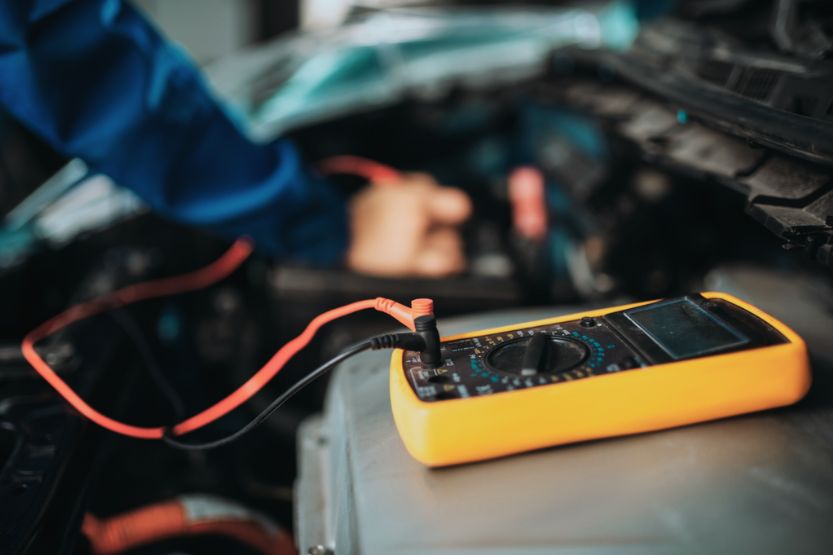
1. Deal with Minor Issues
First, let’s ensure you are not dealing with a minor issue. For example, electric and certain hybrid cars create very little or no noise when you start.
In diesel engines, glow plugs can take a few seconds to warm up (especially during cold starts).
Modern manual transmission cars often need the clutch depressed to start. Not even switching it to neutral will do.
Moreover, in most automatics, you’ll need to put your foot on the brake before the engine starts.
2. Work on the Battery
Now, you can work on the battery next. Does it maintain charge? If not, you will need a new battery. Replace and clean the terminals while you’re here.
Move on to the starter solenoid if the battery is operating flawlessly. Most car owners should either tow their cars to a mechanic at this stage or arrange for one to come to them.
They will take the starter out of the car and examine it to see if the plunger and pinion are functioning. If not, you’ll have to fix it or get a new one.
Assume that the starter and battery are both in good condition. Next, you should have the ignition switch examined.
3. Examine the Terminals, Wirings, Etc.
It’s time to examine the terminals, wiring, connections, and fuses. With a multimeter at the ready, technicians will inspect your car until they identify the root cause.
Fortunately, it won’t be overly pricey if your car won’t start and isn’t producing any noise.
While replacing starter motors costs a few hundred dollars, new batteries cost about $100. A starter motor and an ignition switch are likely to be similar in price (possibly slightly less).
The price of wiring depends on how pervasive the issue is. Expect to pay up to a few hundred dollars or so.
What to Do If Your Car Still Won’t Start After Jumping the Battery
1. Buy a New Battery
Usually, a jump will fix the issue if it’s just your battery. You can buy a new battery, and the problem will be solved. But, if the problem persists, your car most likely has a mechanical issue.
2. Get a Service Like AAA
Many people will get a service like AAA that will help in situations like this, so call one of those. Your insurance provider might offer a comparable service and get your car towed.
Trying to drive your car to the mechanic is the last thing you want to do. It is not smart to try to push it or tow it yourself unless you are a few feet away.
3. Call a Mechanic
Alternatively, you can call your mechanic, as he may be willing to come to pick up the car if it doesn’t start. They might have a tow truck or flatbed truck of their own.
They might charge less than a typical towing firm for this service. Some mechanics may even transport the car back to your residence once they finish.
4. Check the Fuse Box
When your car does not start or does not even make noises after jumping the battery, one of the things you can do is check your fuse box. Your engine bay contains all fuses, either beneath the glove box or under a large black box. There is a suitable fuse for each electrical component in your car.
The fuses are made to blow easily and contribute to avoiding serious harm to a car, such as fires.
Remove your positive battery cable first, then check each fuse individually. If there is one issue, you will need to replace it with a new fuse. So, install the new fuse, link the battery cable, and start the car.
Conclusion – Car Won’t Start (No Noise)
There is no worse feeling than when your car won’t start, and there is no noise, clicking, or anything else. But you don’t need to worry much because diagnosis and repair are simple and inexpensive.
A dead battery is usually the main cause of why your car won’t start while hearing no clicking or other noises.
If the battery is fine and your car still won’t start, it could be because of the following:
- The main fuse (or wires) are not working
- Ignition switch
- Bad connections/ wiring
- Bad starter solenoid
- Bad fuse/relay: Ignition fuse /starter fuse blew
- Security system
- Wrong starting process: clutch pedal pressed
There might not be enough electricity going to the starter. Remember that you can always call a mechanic to come right to you. They have the necessary knowledge and expertise to identify the root cause quickly.


![Clicking Noise When Turning [Causes and How to Fix] clicking noise when turning](https://roadsumo.com/wp-content/uploads/2022/12/clicking-noise-when-turning-150x150.jpg)

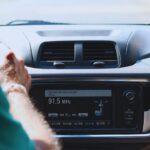

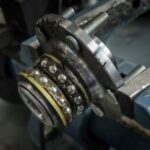
![Read more about the article OBD2 Scanners [8 Best Picks]](https://roadsumo.com/wp-content/uploads/2022/01/obd2-scanners-300x200.jpg)
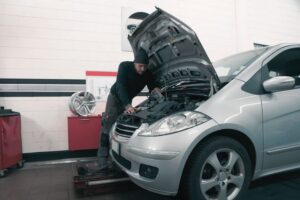
![Read more about the article CV Shaft [CV Axle Shaft Explained – And When to Replace]](https://roadsumo.com/wp-content/uploads/2021/12/CV-shaft-300x200.jpg)